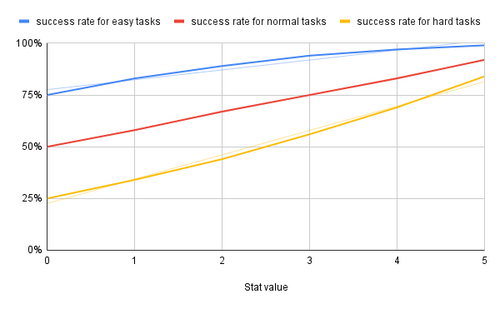d12 FTW

This is a follow-up to the previous dev-log. You might wanna check that one out for context, but in summary, CoReS has been in development for over 8 years and has gone through many iterations and a handful of playtests.
I’m certain the dice mechanics are sound, but I can’t tell if I got the “feel” right until I hear how others feel about it. So I decided to stop adding stuff and run some more tests before piling on more content.
At this stage in development, I want to make sure the d12-based core mechanic is as fun as I imagine it will be. So, why do I think it’s fun?
For starters, the regular dodecahedron is the prettiest of all platonic solids, and it’s just unfair that these gorgeous dice are so often forgotten; lost in the liminal space between the play area, the character sheet, snacks, and the dice bag.
Another reason is that they have unique mathematical properties that are seldom explored. It offers the right amount of granularity. Not too little like a d8, or too much like a d20 (we don’t do d10, see the previous paragraph). The average roll of a die is 6.5, meaning a 50% chance of rolling a 7 or more.
I wanted from the start to make critical rolls more merit-based, meaning criticals would be decided after taking the character’s modifiers into account, not just solely on dice luck. Once this decision was made everything else fell into place.
If I determine that a critical is when you roll 12 or more, then I already know what the cap on the modifiers I’d be using will be; the distance between 7 and 12. A character with a modifier of 6 or more would have over a 50% chance of rolling a critical every time, and even worse, that same character would never fail a roll.
In my opinion, a 50% fail rate is the lowest a player should suffer, even for a character with the worst possible stats.
Using this same principle, the next “smaller” die, a d10 allows for modifiers up to 3, and the next “larger” die, a d20 allows for up to 9. In theory, more granularity is better, but d12 + 9 is just too much math to do by hand for most people. Besides, the d20 is so played out, I mean, c’mon.
Speaking of too much math, I also considered a 2d6 system for a while, it became a mess once I started working with difficulty modifiers, and the fact that there’s no “50%” number.
The first concepts used negative modifiers for difficulty. So a character with a +5 stat would have 50% odds of success on a task with a -5 difficulty. Eventually, that was left exclusively for contested rolls, where an enemy character has their own modifier. This way the player rolls for themselves and the enemy, and both their modifiers “tip the scales,” which feels much fairer than pitting two random dice against each other.
Once all these mechanics are in place, using “pick highest/lowest” mechanics for difficulty adds to the sense of reliable skill vs random circumstance without adding more math.
Also, did I mention that d12 are unfairly underused in pretty much every other TTRPG?
Get Blaze Of Glory
Blaze Of Glory
A Simple Cyberpunk TTRPG - powered by CoReS [EARLY ACCESS]
| Status | In development |
| Category | Physical game |
| Author | teh_201d |
| Tags | Cyberpunk, d12, Dice, Indie, rules-lite, tabletop-role-playing-game, Tabletop role-playing game |
| Languages | English |
More posts
- Status updateAug 15, 2024
- Feedback wanted!Dec 06, 2023
- Version 0.2 is live!Aug 31, 2023
- Regarding SEOAug 31, 2023
- Version 0.2 coming soon!Aug 04, 2023
- 0.1 is live! Now with 100% more layout!Mar 17, 2023
- Blaze of Glory 0.0.2 UpdateOct 25, 2022
- Playtest 1: Spare PartsJul 05, 2022
Leave a comment
Log in with itch.io to leave a comment.